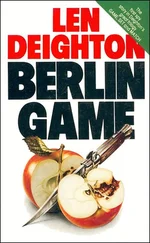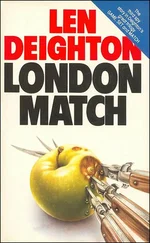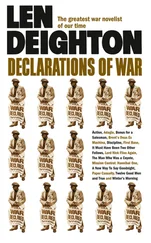Len Deighton - XPD
Здесь есть возможность читать онлайн «Len Deighton - XPD» — ознакомительный отрывок электронной книги совершенно бесплатно, а после прочтения отрывка купить полную версию. В некоторых случаях можно слушать аудио, скачать через торрент в формате fb2 и присутствует краткое содержание. Жанр: Триллер, на английском языке. Описание произведения, (предисловие) а так же отзывы посетителей доступны на портале библиотеки ЛибКат.
- Название:XPD
- Автор:
- Жанр:
- Год:неизвестен
- ISBN:нет данных
- Рейтинг книги:4 / 5. Голосов: 1
-
Избранное:Добавить в избранное
- Отзывы:
-
Ваша оценка:
- 80
- 1
- 2
- 3
- 4
- 5
XPD: краткое содержание, описание и аннотация
Предлагаем к чтению аннотацию, описание, краткое содержание или предисловие (зависит от того, что написал сам автор книги «XPD»). Если вы не нашли необходимую информацию о книге — напишите в комментариях, мы постараемся отыскать её.
XPD — читать онлайн ознакомительный отрывок
Ниже представлен текст книги, разбитый по страницам. Система сохранения места последней прочитанной страницы, позволяет с удобством читать онлайн бесплатно книгу «XPD», без необходимости каждый раз заново искать на чём Вы остановились. Поставьте закладку, и сможете в любой момент перейти на страницу, на которой закончили чтение.
Интервал:
Закладка:
‘Too bad about you and Natalie,’ he said without turning from the window. His voice was low and carefully modulated-the voice of a man self-conscious about the impression he made.
The warm air from the Pacific Ocean was heavy, saturated with water vapour. It built up towering storm clouds, dragging them up to the mountains, where they condensed, dumping solid sheets of tropical rain across the Los Angeles basin, close to the house, a tall palm tree bent under a cruel gust of wind that tried to snap it in two. Suddenly released, the palm straightened with a force that made the fronds dance and whip the air loudly enough to make MacIver flinch and move from the window.
‘It lasted three months,’ said Billy. He guessed his father had discussed the failure of his marriage and was annoyed. ‘Three months is par for the course these days, Billy,’ said MacIver. He turned round, fixed him with his wide-open eyes and smiled. In spite of himself, Billy smiled too. He was twenty-four years old, slim, with lots of dark wavy hair and a deep tan that continued all the way to where a gold medallion dangled inside his unbuttoned shirt. Billy wore thin, wire-rimmed, yellow spectacles that he had bought during his skiing holiday in Aspen and had been wearing ever since. Now he took them off.
‘Dad told you, did he?’ He threw the anti-glare spectacles on to the coffee table.
‘Come on, Billy. I was here two years ago when you were building the new staircase to make a separate apartment for the two of you.’
‘I remember,’ said Billy, mollified by this explanation. ‘Natalie was not ready for marriage. She was into the feminist movement in a big way.’
‘Well, your dad’s a man’s man, Billy. We both know that.’ MacIver took out his cigarettes and lit one.
‘It was nothing to do with dad,’ Billy said. ‘She met this damned poet on a TV talks show she was on. They took off to live in British Columbia… She liked dad.’
MacIver smiled the same lazy smile and nodded. He did not believe that. ‘We both know your dad, Billy. He’s a wonderful guy. They broke the mould when they made Charlie Stein. When we were in the army he ran that damned battalion. Don’t let anyone tell you different. Corporal Stein ran that battalion. And I’ll tell you this… ’ he gestured with his large hands so that the fraternity ring shone in the dull light, ‘I heard the colonel say the same thing at one of the battalion reunions. Charlie Stein ran the battalion. Everyone knew it. But he’s not always easy to get along with. Right, Billy?’
‘You were an officer, were you?’
‘Captain. Just for the last weeks of my service. But I finally made captain. Captain MacIver; I had it painted on the door of my office. The goddamned sergeant from the paint shop came over and wanted to argue about it. But I told him that I’d waited too goddamned long for that promotion to pass up the right to have it on my office door. I made the signwriter put it on there, just for that final month of my army service.’ He gestured again, using the cigarette so that it left smoke patterns in the still air.
Billy Stein nodded and pushed his magazine aside to give his full attention to the visitor. ‘Is it true you pitched for Babe Ruth?’
‘Your dad tell you, did he?’ MacIver smiled.
‘That was when you were at Harvard, was it, Mr MacIver?’ There was something in Billy Stein’s voice that warned the visitor against answering. He hesitated. The only sound was the rain; it hammered on the windows and rushed along the gutterings and gurgled in the rainpipes. Billy stared at him but MacIver was giving all his attention to his cigarette.
Billy waited a long time, then he said, ‘You were never at Harvard, Mr MacIver; I checked it. And I checked your credit rating too. You don’t own any house in Palm Springs, nor that apartment you talked about. You’re a phoney, Mr MacIver.’ Billy Stein’s voice was quiet and matter of fact, as if they were discussing some person who was not present ‘Even that car outside is not yours-the payments are made in the name of your ex-wife.’
‘The money comes from me,’ snapped MacIver, relieved to find at least one accusation that he could refute. Then he recovered himself and reassumed the easy, relaxed smile. ‘Seems like you out-guessed me there, Billy.’ Effortlessly he retrenched and tried to salvage some measure of advantage from the confrontation. The only sign of his unease was the way in which he was now twisting the end of his moustache instead of stroking it
‘I guessed you were a phoney,’ said Billy Stein. There was no satisfaction in his voice. ‘I didn’t run any check on your credit rating; I just guessed you were a phoney.’ He was angry with himself for not mentioning the money that MacIver had had from his father. He had come across his father’s cheque book in the bureau and found the list of six entries on the memo pages at the back. More than six thousand dollars had been paid to MacIver between December 10, 1978, and April 4, 1979, and every cheque was made out to cash payment. It was that that had encouraged Billy’s suspicion.
‘I ran into a tough period last autumn; suppliers needed fast repayment and I couldn’t meet the deadlines.’
‘The diamonds that you bought here in town and sent to your contact man in Seoul?’ said Billy scornfully. ‘Was it five thousand per cent on every dollar?’
‘You’ve got a good memory, Billy.’ He smoothed his tie. ‘You’d be a tough guy to do business with. I wish I had a partner like you. I listen to these hard-luck stories from guys who owe me money and I melt.’
‘I bet,’ said Billy. Fierce gusts pounded the windows and made the rain in the gutters slop over and stream down the glass. There was a crackle of static like brittle paper being crushed, and a faint flicker of lightning lit the room. The sound silenced the two men.
Billy Stein stared at MacIver. There was no malevolence in his eyes, no violence nor desire for argument. But there was no compassion there either. His private income and affluent life-style had made Billy Stein intolerant of the compromises to which less fortunate men were forced. The exaggerations of the old, the half-truths of the poor and the misdemeanours of the desperate found no mitigation in Billy Stein’s judgement. And so now Miles knew no way to counter the young man’s calm judicial gaze.
‘I know what you’re thinking, Billy… the money I owe your father. I’m going to pay every penny of it back to him. And I mean within the next six weeks or so. That’s what I wanted to see him about.’
‘What happens in six weeks?’
Miles MacIver had always been a careful man, keeping a careful separation between the vague confident announcements of present or future prosperity-which were invariably a part of his demeanour-and the more stringent financial and commercial realities. But, faced with Billy Stein’s calm, patronizing inquiry, MacIver was persuaded to tell him the truth. It was a decision that was to change the lives of many people, and end the lives of several.
‘I’ll tell you what happens in six weeks, Billy,’ said MacIver, hitching his trousers at the knees and seating himself on the armchair facing the young man. ‘I get the money for the movie rights of my war memoirs. That’s what happens in six weeks.’ He smiled and reached across to the big china ashtray marked Café de la Paix -Billy’s father had brought it back from Paris in 1945. He dragged the ashtray close to his hand and flicked into it a long section of ash.
‘Movie rights?’ said Billy Stein, and MacIver was gratified to have provoked him at last into a reaction. ‘Your war memoirs?’
‘Twenty-five thousand dollars,’ said MacIver. He flicked his cigarette again, even though there was no ash on it. ‘They have got a professional writer working on my story right now.’
Читать дальшеИнтервал:
Закладка:
Похожие книги на «XPD»
Представляем Вашему вниманию похожие книги на «XPD» списком для выбора. Мы отобрали схожую по названию и смыслу литературу в надежде предоставить читателям больше вариантов отыскать новые, интересные, ещё непрочитанные произведения.
Обсуждение, отзывы о книге «XPD» и просто собственные мнения читателей. Оставьте ваши комментарии, напишите, что Вы думаете о произведении, его смысле или главных героях. Укажите что конкретно понравилось, а что нет, и почему Вы так считаете.












